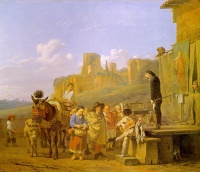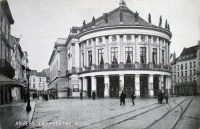Theatre
From The Art and Popular Culture Encyclopedia
| Revision as of 00:19, 12 May 2007 WikiSysop (Talk | contribs) (→See) ← Previous diff |
Current revision Jahsonic (Talk | contribs) |
||
| Line 1: | Line 1: | ||
| + | [[Image:Theatre from Ars Memoriae by Robert Fludd.jpg|thumb|left|200px|[[Theatrum Orbi]] engraving by Theodor de Bry from the chapter on Ars Memoriae in ''Utriusque cosmi maioris scilicet et minoris metaphysica'' by Robert Fludd]] | ||
| + | {| class="toccolours" style="float: left; margin-left: 1em; margin-right: 2em; font-size: 85%; background:#c6dbf7; color:black; width:30em; max-width: 40%;" cellspacing="5" | ||
| + | | style="text-align: left;" | | ||
| + | "Only animals who are below civilization and the angels who are beyond it can be [[sincerity|sincere]]. [[Human|Human being]]s are, necessarily, [[actor]]s who cannot become something before they have first [[Role-playing|pretended]] to be it; and they can be divided, not into the [[Hypocrisy|hypocritical]] and the sincere, but into the sane who know they are acting and the [[Madness|mad]] do not." --''[[The Age of Anxiety]]'' (1947) by [[W. H. Auden]] | ||
| + | <hr> | ||
| + | "Although [[Theatre|theater]] is now a [[highbrow]] form, this was not so until the nineteenth century." --''[[Fringe and Fortune]]'' (1996) - Wesley Monroe, Jr., page 73 | ||
| + | <hr> | ||
| + | “By the turn of the century, [[Shakespeare]] had been converted from a popular playwright whose dramas were the property of all those who flocked to see them, into a sacred author who had to be protected from ignorant audiences and overbearing actors threatening the integrity of his creations." --''[[Highbrow/Lowbrow]]'' (1988) by Lawrence W. Levine | ||
| + | <hr> | ||
| + | "All the world's a [[Stage (theatre)|stage]],<br /> | ||
| + | And all the men and women merely players [[All the world's a stage|[...]]]<br /> | ||
| + | --William Shakespeare's ''As You Like It'' | ||
| + | |} | ||
| + | [[Image:A Party of Charlatans in an Italian Landscape is a painting by Karel Dujardin in the Louvre..jpg|thumb|right|200px|''[[A Party of Charlatans in an Italian Landscape]]'' (1657) by Karel Dujardin]] | ||
| + | [[Image:Melodrama by Daumier.jpg|thumb|200px|right|''[[At the Theater (The Melodrama)]]'' (c. 1860-64) by Honoré Daumier]] | ||
| + | [[Image:Véritable portrait de Monsieur Ubu, par Alfred Jarry (1896).png|thumb|right|200px|''[[Ubu Roi]]'' premiered on December 10 1896]] | ||
| + | [[Image:Bourlaschouwburg.jpg|thumb|200px|right|Historic photo of the [[Bourla Theatre]] in Antwerp]] | ||
| {{Template}} | {{Template}} | ||
| - | '''Theatre''' (or '''theater''', see [[American and British English spelling differences|spelling differences]]) (from French "''théâtre''", from Greek "theatron", ''θέατρον'', meaning "place of seeing") is the branch of the [[performing arts]] concerned with [[acting]] out stories in front of an audience using combinations of speech, gesture, mime, puppets, music, dance, sound and spectacle — indeed any one or more elements of the other performing arts. Theatre has been defined as what "occurs when one or more human beings, isolated in time and/or space, present themselves to another or others." In addition to the standard narrative dialogue style, theatre takes other forms, such as [[opera]], [[ballet]], [[mime artist|mime]], [[kabuki]] and [[puppetry]].[http://en.wikipedia.org/wiki/{{PAGENAMEE}}] [Apr 2007] | + | '''Theatre''' (or '''theater''') (from Greek "theatron", meaning "place of seeing") is the branch of the [[performing arts]] concerned with [[acting]] out stories in front of an audience using combinations of speech, gesture, mime, puppets, music, dance, sound and spectacle — indeed any one or more elements of the other performing arts. Theatre has been defined as what "occurs when one or more human beings, isolated in time and/or space, present themselves to another or others." Theatre is the second stage in the [[history of fiction]]. |
| + | ==Etymology== | ||
| + | Theatre derives from Greek '''theatron''', '''thea''', signifies to [[see]], and [[tron]] signifies [[place]]: place for seeing. | ||
| - | == See == | + | |
| + | == Theatre makers == | ||
| + | *[[Shakespeare]] | ||
| + | *[[Peter Brook]] | ||
| + | *[[Antonin Artaud]] | ||
| + | *[[Alfred Jarry]] | ||
| + | ==Late modern theatre== | ||
| + | :''[[Twentieth century theatre]]'' | ||
| + | |||
| + | [[Late Modern]], and especially [[twentieth century theatre]], often continues the project of [[Realism (theatre)|realism]]. However, there has also been a great deal of [[experimental theatre]] that rejects the conventions of realism and earlier forms. Examples include: [[Epic theater|Epic theatre]], [[theatre of the absurd]], and [[postmodern]] theatre. Key figures of the century include: [[Luigi Pirandello]], [[Bertolt Brecht]], [[Antonin Artaud]], [[Konstantin Stanislavski]], [[Harold Pinter]], [[Eugene O'Neill]], [[Samuel Beckett]], [[Dario Fo]] and [[Tony Kushner]]. | ||
| + | |||
| + | A number of [[Aesthetics|aesthetic]] movements emerged in the 20th century, including: | ||
| + | *[[Naturalism (theatre)|Naturalism]] | ||
| + | *[[Realism (theatre)|Realism]] | ||
| + | *[[Dadaism]] | ||
| + | *[[Expressionism]] | ||
| + | *[[Surrealism]] | ||
| + | *[[Theatre of the absurd]] | ||
| + | *[[Postmodern theater|Postmodernism]] | ||
| + | |||
| + | == See also== | ||
| + | *[[History of fiction]] | ||
| + | *[[History of theatre]] | ||
| + | *Theatrical, which means [[fake]] and [[exaggerated]]. | ||
| *[[Drama]] | *[[Drama]] | ||
| *[[Restoration spectacular]], [[blockbuster]] avant la lettre | *[[Restoration spectacular]], [[blockbuster]] avant la lettre | ||
| + | *[[Theatre of the Absurd]] | ||
| + | *[[Theatre of Cruelty]] | ||
| + | *[[Symbolist theatre]] | ||
| + | *[[Anatomical theatre]] | ||
| + | *[[Theatre-fiction ]] | ||
| + | *[[Nicola Sabbatini ]] | ||
| + | {{GFDL}} | ||
Current revision

|
"Only animals who are below civilization and the angels who are beyond it can be sincere. Human beings are, necessarily, actors who cannot become something before they have first pretended to be it; and they can be divided, not into the hypocritical and the sincere, but into the sane who know they are acting and the mad do not." --The Age of Anxiety (1947) by W. H. Auden "Although theater is now a highbrow form, this was not so until the nineteenth century." --Fringe and Fortune (1996) - Wesley Monroe, Jr., page 73 “By the turn of the century, Shakespeare had been converted from a popular playwright whose dramas were the property of all those who flocked to see them, into a sacred author who had to be protected from ignorant audiences and overbearing actors threatening the integrity of his creations." --Highbrow/Lowbrow (1988) by Lawrence W. Levine "All the world's a stage, |


.png)

|
Related e |
|
Featured: |
Theatre (or theater) (from Greek "theatron", meaning "place of seeing") is the branch of the performing arts concerned with acting out stories in front of an audience using combinations of speech, gesture, mime, puppets, music, dance, sound and spectacle — indeed any one or more elements of the other performing arts. Theatre has been defined as what "occurs when one or more human beings, isolated in time and/or space, present themselves to another or others." Theatre is the second stage in the history of fiction.
Contents |
Etymology
Theatre derives from Greek theatron, thea, signifies to see, and tron signifies place: place for seeing.
Theatre makers
Late modern theatre
Late Modern, and especially twentieth century theatre, often continues the project of realism. However, there has also been a great deal of experimental theatre that rejects the conventions of realism and earlier forms. Examples include: Epic theatre, theatre of the absurd, and postmodern theatre. Key figures of the century include: Luigi Pirandello, Bertolt Brecht, Antonin Artaud, Konstantin Stanislavski, Harold Pinter, Eugene O'Neill, Samuel Beckett, Dario Fo and Tony Kushner.
A number of aesthetic movements emerged in the 20th century, including:
See also
- History of fiction
- History of theatre
- Theatrical, which means fake and exaggerated.
- Drama
- Restoration spectacular, blockbuster avant la lettre
- Theatre of the Absurd
- Theatre of Cruelty
- Symbolist theatre
- Anatomical theatre
- Theatre-fiction
- Nicola Sabbatini

